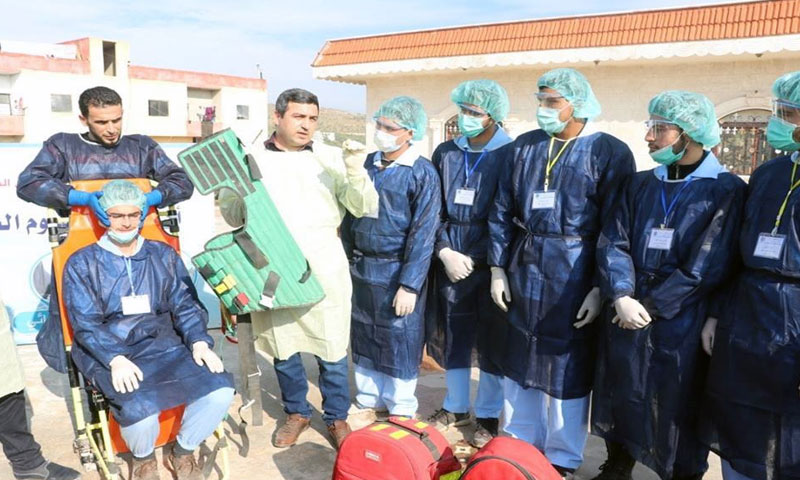After eight years during which the Academy of Health Sciences in Idlib sought to train its staff, develop its programs and graduate medical practitioners capable of elevating the medical sector in northern Syria, the Academy has recently gained international recognition, which has present it with greater challenges and responsibilities in maintaining and developing a standard of its educational process.
The Academy of Health Sciences, based in the town of Kah in the Idlib governorate, received recognition by the Accreditation, Certification and Quality Assurance Institute (ACQUIN) earlier this month.
The director of the Public Relations and Outreach Office in the Academy, Mustafa Kayali, described this recent recognition as scientific and academic, and apolitical, noting that it took nearly two years during which the Academy sought to meet all scientific standards and conditions required.
Speaking to Enab Baladi, Kayali said, “The significance of this recognition lies in the fact that it is a guarantee for students affiliated with the Academy, which helps them enter the job market after graduation, or complete their education abroad.”
“Recognition is a guarantee of the educational process as a whole, and proof that the information provided is of a high standard, and that the staff is qualified,” he added.
Founded in 2001, ACQUIN is based in Germany, and aims to provide “reliable” accreditation and consultation on the quality of education to universities and scientific institutes around the world.
The Institute defines itself as a registered institute recognized by the European Union’s Scientific Committees. Its rankings include more than 160 higher education institutions around the world, including universities in Germany, Austria, Switzerland and the Middle East, as well as scientific and professional institutes and bodies.
Standards and Challenges
Kayali considered ACQUIN’s recognition of the Academy as a challenge with greater responsibility. The most important of these are the maintenance of the standard and quality of education, as well as continuous monitoring and evaluation, and developing the educational process in order to maintain the Academy’s accreditation.
On the recognition criteria, Kayali said they can be summarized in three points; the Academy of Health Sciences had to obtain received scientific accreditation, sign memoranda of cooperation with universities and international educational institutions (twinning), and gain membership of a recognized educational institution.
In the past two years, the Academy sought to meet these criteria, as memoranda of cooperation were signed with a number of educational institutions around the world, including the South African Emergency Medical Center, the British Healthcare Academy, the Eastern Mediterranean University in Turkey and others.
The Academy also obtained international memberships, such as in the American Society for Academic Emergency Medicine, the International Association of Medical Colleges which only includes 170 universities around the world, and a United Nations Higher Education seat called the United Nations Academic Impact.
What is the Academy of Health Sciences?
The Academy of Health Sciences was established in Idlib in 2011 to provide first aid education, and continued until 2016 in providing training courses in emergency medicine to preserve the life of the injured, with the support of the Syrian Expatriate Medical Association.
After 2016, the Academy moved towards professional education, and established three institutes: Emergency Medicine, Nursing and Physiotherapy, at a time when there was a need for a qualified medical staff to deal with critical conditions and special cases in northern Syria.
The headquarters of the Academy moved between several cities and towns in the Idlib governorate, recently settling in the town of Kah in the Dana area of the Harim district.
Each year, the Academy receives almost 90 students free of charge, within standards that include admission tests and physicals conducted by academic specialists.

